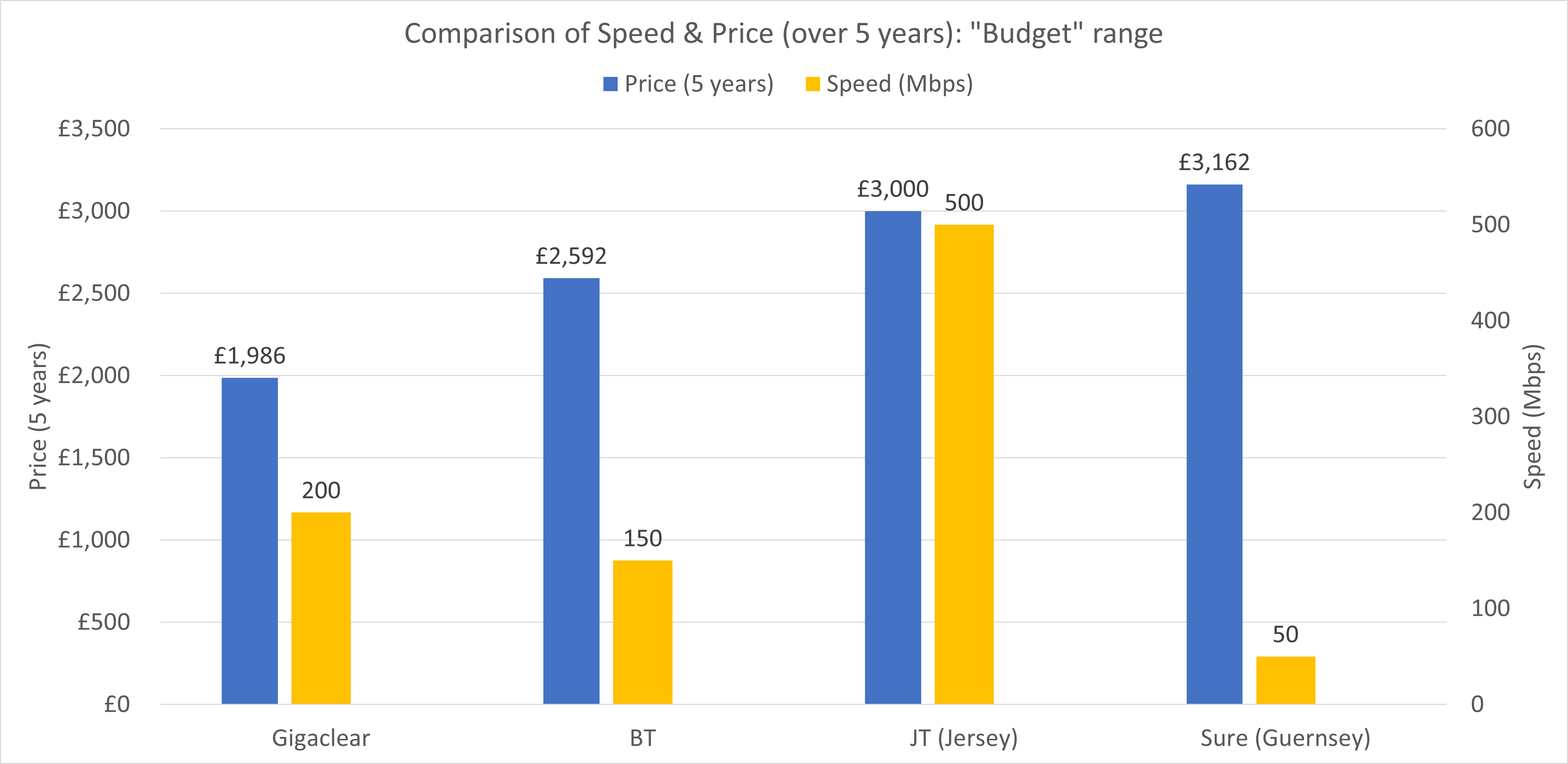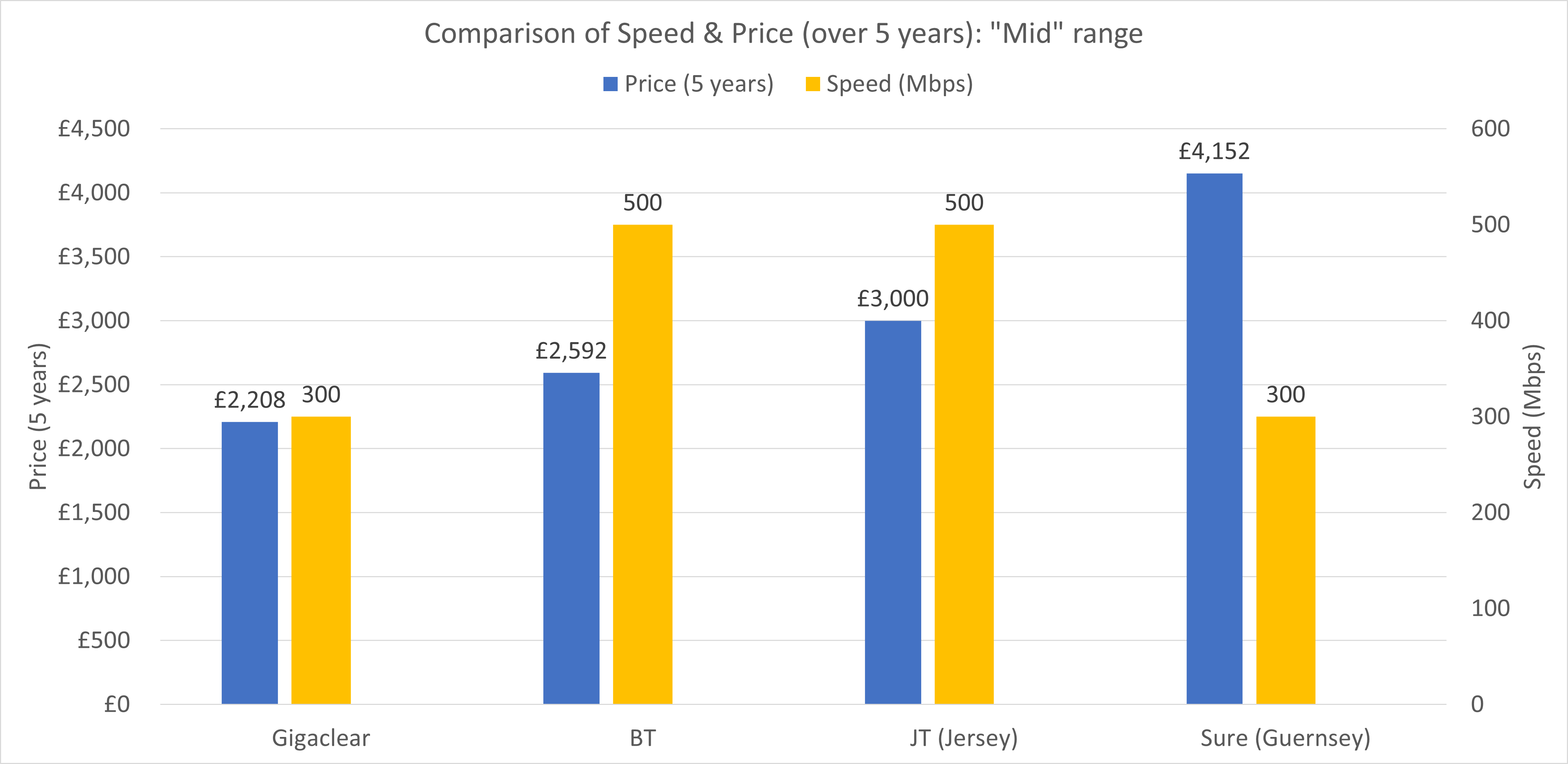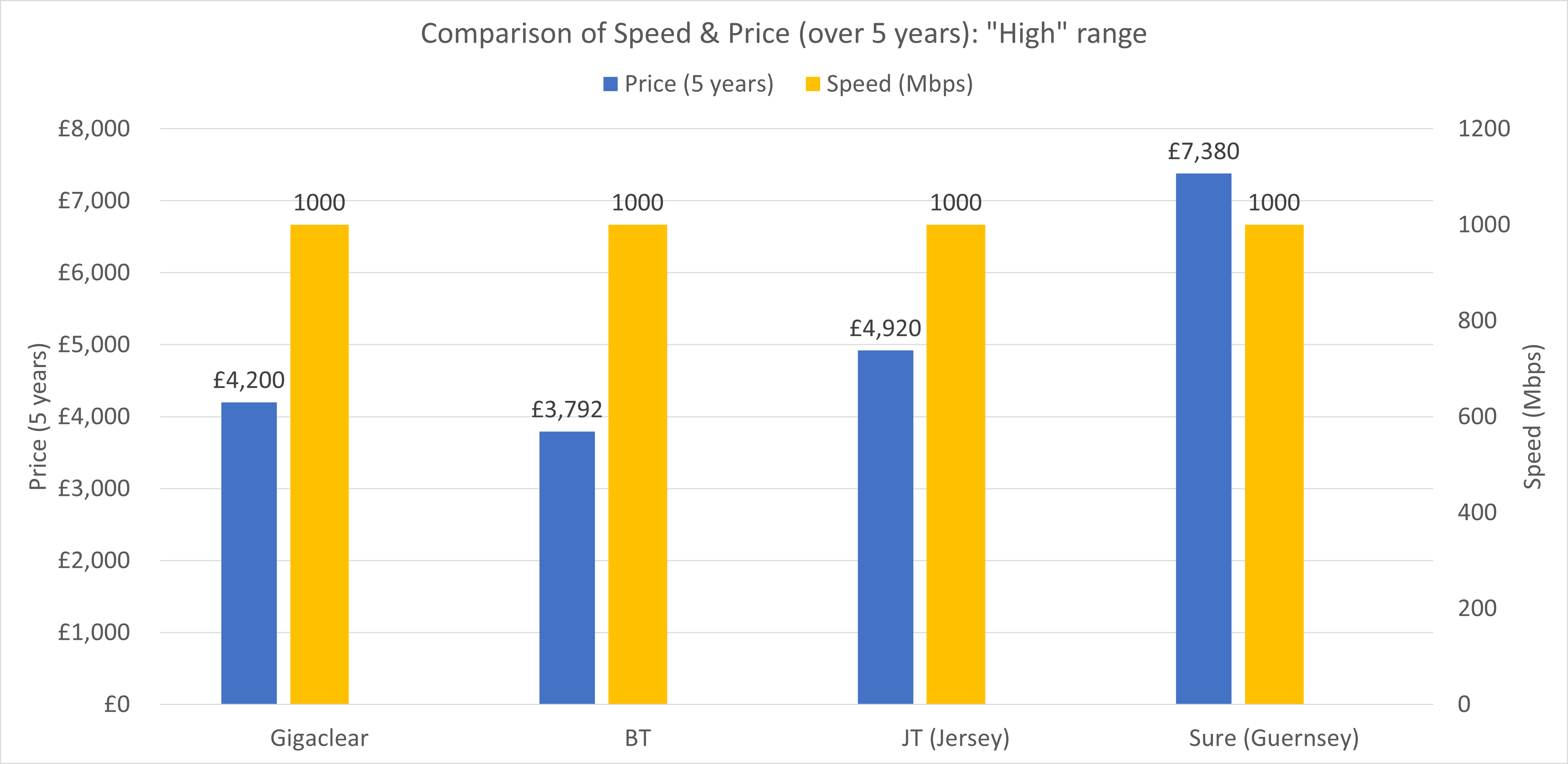Last year, it was announced that Sure was finally going to be rolling out an island-wide FTTH service to connect to all properites by 2026.
However, it did take £12.5m of taxpayers money for them to finally do so. Potentially without the States’ intervention, we would be stuck on VDSL forever! Nevertheless, this is a good thing for the island and on balance a bit of public funding for something as important as broadband is probably worth it.
My only minor concern regarding this funding, is exactly what kind of deal the States and Sure have. Unfortunately, it seems the actual agreement between them has not been made public (which isn’t great from a transparency perspective). Was the £12.5m just a lump sum of cash handed to Sure to use however they like? Or, is there some sort of clawback mechanism so that if Sure ends up making a greater profit off the service compared to before, they hand some of the money back? (The UK government subsidy scheme for fibre rollout had a clawback mechanism).
Regardless of the deals that happened behind closed doors, we do instead get to see the end-user pricing for the new fibre services:
| Service Name | Download Speed | Upload Speed | Monthly Price* |
| Basic Fibre | 30Mbps | 3Mbps | £43 |
| Essential Fibre | 50Mbps | 5Mbps | £52 |
| Superfast Fibre | 100Mbps | 10Mbps | £58 |
| Ultrafast Fibre | 300Mbps | 30Mbps | £69 |
| Gigabit Fibre | 1Gbps | 50Mbps | £126 |
My immediate impression when I saw these prices, was that they were expensive. We have already gotten used to paying more for our telecoms in Guernsey compared to the UK (which is somewhat understandable given our location and smaller market size). However, the new fibre pricing is problematic for I think a few reasons:
- The top tier, gigabit service costing £126 per month seems extremely expensive. It seems to be set at a level to discourage basically anyone from taking it.
- The upload speeds across the board are pretty miserable. My existing VDSL service has a 20Mbps upload speed. I have it on relatively good authority that Sure are deploying GPON, which has a technological reason for asymmetric upload speeds. GPON is however cheaper to deploy than P2P fibre. To offer just 3Mbps and 5Mpbs upload speeds on a fibre product is pretty terrible, regardless of the technology used.
- The ‘Basic Fibre’ and ‘Essential Fibre’ products are very expensive for the speeds delivered. I don’t even think these products should exist at all.
I thought it would be a good idea to do a comparison of the fibre plans against other jurisdictions, namely within the UK (BT and Gigaclear) and within Jersey (JT). Whilst I fully accept that as a smaller island we are always going to pay a bit more for the same level of service, I think the graphs below demonstrate just how big a difference there is in pricing.
The Graphs
I have split my comparison up into 3 ‘tiers’: ‘Budget’, ‘Mid range’ and ‘High range’, to try and compare like products with each other. In order to capture introductory pricing (i.e. a discount for the first x months of service) and also to capture that Sure doesn’t provide a free router (you effectively pay £72 for one) , I averaged the pricing out over 5 years. This gives a fairer idea of pricing.
The bar charts are displayed over two axes. The blue bar represents the 5 year cost, on the left hand axis, whilst the yellow represents the headline speed, on the right axis.

First, the ‘Budget’ services. Sure is undoubtedly the most expensive service in this category. It is also the slowest, by some margin! In fact, the next fastest service to compare with is BT fibre and this is 3x faster. BT is also nearly £600 cheaper over the 5 year period. Note here that I chose to use Sure’s 50Mbps product instead of the 30Mbps product. Whilst the 30Mbps service is slightly cheaper, it is even slower and it didn’t seem right to compare this with services in the 100’s of Mbps range.
Now is probably a good time to mention that in Jersey, JT have usage caps on their services. I have chosen to use their middle tier product offering which comes with a 100GB data cap during daytime use (I assume this is monthly). Sure is unlimited.

Next, the ‘Mid range’ offerings. Sure is again the most expensive here, by some significant margin. JT is over £1000 cheaper in Jersey over the same time period, and is also offering a faster service (caveat: but with data caps!). The UK providers come in significantly cheaper, and in BT’s case faster than what Sure offer. I would actually argue that the ‘mid range’ service is the most competitive area for Sure. Despite the highest cost, the speeds are competitive with the others in this segment.

Finally, the ‘High end’ category. All of the providers here offer 1Gbps services. Again, JT’s service has a 300GB data cap during day usage, the others are all unlimited. In the UK, BT actually comes in cheaper than Gigaclear, but it is worth mentioning that all of Gigaclear’s speeds are symmetric (1Gbps upload and download speeds). Here we really see the high cost of Sure’s 1Gbps service. It is approaching 2x the cost of the UK providers, and 1.5x more expensive than our neighbouring island.
A few quick points that need highlighting:
- Sure’s 50Mbps service in the ‘budget’ tier is actually more expensive than the competition in the ‘mid-range’ tier! Except we are looking at competitors offering 300 or 500Mbps services in this tier. Sure’s 30Mbps service would be cheaper, but the speed is woefully slow.
- Sure doesn’t offer a router as standard. You have to pay an additional £3 per month over 2 years to ‘buy’ the basic router. This is pretty bad and for the high cost of this service, it should be free. Note I have included the cost of this in the graphs.
- Gigaclear and BT don’t offer voice services by default (i.e. no landline rental is included). I would argue that for 90% of people, this is fine. Very few people would use landlines for calling and only have it to support their broadband.
Conclusion
Overall, I do feel that the pricing for fibre broadband in Guernsey is too high when compared to the UK and Jersey. In particular, the ‘budget’ services are very poor value for money and the gigabit service is insanely expensive.
I think a fairer service offering (for the consumer at least) should look something more like this:
| Service Name | Download Speed | Upload Speed | Monthly Price |
| Superfast Fibre | 100Mbps | ||
| Ultrafast Fibre | 300Mbps | ||
| Gigabit Fibre | 1Gbps | 100Mbps |
- Scrap the Basic and Essential tiers, they are slow and should barely qualify as a ‘fibre’ broadband service
- Make the 100Mbps tier the entry-level one with matching pricing
- Bump the upload speeds a bit to differentiate it from the existing VDSL services
- Lower the pricing on the 300Mbps service so it is more similar to the mid-tier VDSL price.
- Cut the price of gigabit fibre so it is less than a 3-figure number. £99 is still very high.
